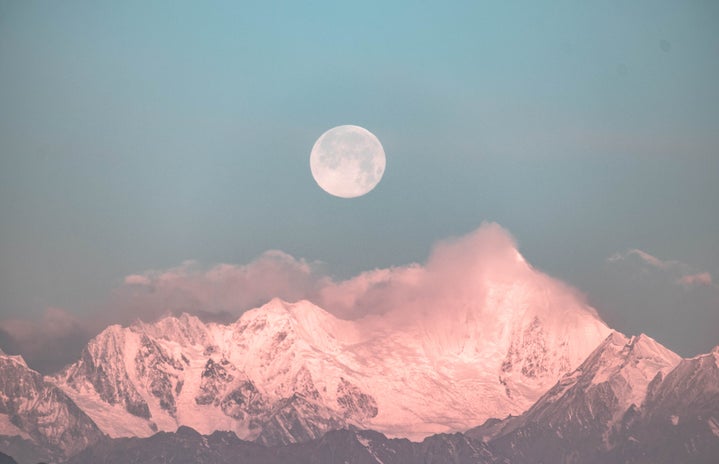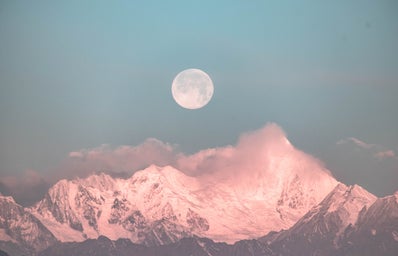In my culture, its custom to always praise the moon for all its glory. Throughout my childhood, my grandmother blessed me with stories from her youth and how the moon was specifically a goddess that had the power to heal and grant peace.
Although I have drifted from those beliefs, I sometimes catch myself giving credit to the moon for certain situations, such as the behavior of others. I was taught from my grandmother that the moon had an ability to change the moods and behavior of people, especially during specific events such as new moons and full moons. This got me thinking – is there a possibility that could be true?
It’s no question that the ocean tides are strictly due to the gravitational pull of the moon, and there is even evidence that lifeforms in the sea can be affected by the moon’s influence as well, so who’s to say it doesn’t affect humans as well?
Although the moon affecting our moods and behaviors are mostly of myth, there has been research that backs up the idea that the moon may actually contribute to affecting our behavioral patterns. Full moons, especially, have a strong influence on our moods and behaviors.
The Moon and Sleep Patterns
In a 2016 study published in the Frontiers in Pediatrics, researchers attempted to understand if children in 12 different countries from the ages of 9-11 could possibly be affected by the lunar cycles. Researchers tested different phases of the moon and how children were affected both sleep-wise, and physically wise. The results showed that throughout all the tests, the correlation between physical activity and sedentary time were not affected by the moon’s phases, although there was a 1% difference of sleep time during a full moon compared to a new moon. “Collectively, the current study provides solid evidence to the effect that the associations between moon phases and children’s sleep duration/activity behaviors are not meaningful from a public health standpoint (small effect sizes).”
Although that doesn’t sound promising, according to a 2013 study published in the academic journal Current Biology – the moon showed signs that it influences and regulates your sleep patterns. In this study, researchers attempted to rid of the bias of increased moonlight (a main contributor to the idea that the moon affects our sleep) and instead focus on information regarding non-rapid eye movement, electroencephalogram activity (a record of brain activity), and hormones such as melatonin and cortisol secretion. “Electroencephalogram (EEG) delta activity during NREM sleep, an indicator of deep sleep, decreased by 30%, time to fall asleep increased by 5 min, and EEG-assessed total sleep duration was reduced by 20 min. These changes were associated with a decrease in subjective sleep quality and diminished endogenous melatonin levels.“
The Moon and Behavior
In 2019, a study was published which took a look at the rates of “psychiatric admissions, discharges, and lengths of stays” during various lunar cycles. How researchers went about this was by examining the data of 17,966 people, who were treated in an inpatient setting within Switzerland. Although the idea had promise, it was concluded that there was no correlation with inpatient treatment nor the stay and the lunar cycles.“Despite the widely-held popular belief that the moon effects peoples’ mental health and subsequently psychiatric treatment, our study was unable to support any connection between any phase of the lunar cycle and either admission or discharge rates, nor with length of stay, at psychiatric inpatient clinics.”
Although the findings were inconclusive, another study posted to the Medical Journal of Australia suggests that violent behaviors could possibly be associated due to a full moon’s influence. Researchers investigated the idea that the phases of the moon could cause “behavioral disturbances” within emergency departments (where it is normal to encounter aggressive behaviors) and concluded that 23% of aggressive behaviors occurred during a full moon (which happened to be double that of other moon phases).“60 of the 91 patients (66%) had alcohol intoxication and/or psychostimulant toxicity. Five of the 91 patients attacked staff — biting (2), spitting (1), kicking (1) and scratching (1).”
In Conclusion…
There has been a lot of speculation and debate on whether or not the moon affect human physiology, and for now it’s best to say that there is no real answer as to how the moon affects our biological physiology confidently as there are many factors that play into the moons influence. However, with the evidence that has been announced, it is safe to say that full moons do influence human behaviors more so than that of any other moon phase. Although I have drifted from most of my beliefs as a child, I’m happy to hear a little truth to my grandmother’s beliefs.


